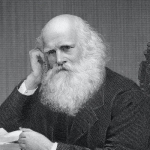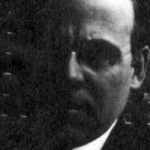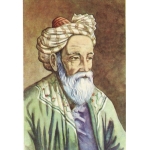He that had come that morning,
One after the other,
Over seven hills,
Each of a new color,
Came now by the last tree,
By the red-colored valley,
To a gray river
Wide as the sea.
There at the shingle
A listing wherry
What should it carry?
There on the shelving,
Three dark gentlemen.
Might they direct him?
Three gentlemen.
“Cable, friend John, John Cable,”
When they saw him they said,
“Come and be company
As far as the far side.”
“Come follow the feet,” they said,
“Of your family,
Of your old father
That came already this way.”
But Cable said, “First I must go
Once to my sister again;
What will she do come spring
And no man on her garden?
She will say ‘Weeds are alive
From here to the Stream of Friday;
I grieve for my brother’s plowing,’
Then break and cry.”
“Lose no sleep,” they said, “for that fallow:
She will say before summer,
‘I can get me a daylong man,
Do better than a brother.’ ”
Cable said, “I think of my wife:
Dearly she needs consoling;
I must go back for a little
For fear she die of grieving.”
“Cable,” they said, “John Cable,
Ask no such wild favor;
Still, if you fear she die soon,
The boat might wait for her.”
But Cable said, “I remember:
Out of charity let me
Go shore up my poorly mother,
Cries all afternoon.”
They said, “She is old and far,
Far and rheumy with years,
And, if you like, we shall take
No note of her tears.”
But Cable said, “I am neither
Your hired man nor maid,
Your dog nor shadow
Nor your ape to be led.”
He said, “I must go back:
Once I heard someone say
That the hollow Stream of Friday
Is a rank place to lie;
And this word, now I remember,
Makes me sorry: have you
Thought of my own body
I was always good to?
The frame that was my devotion
And my blessing was,
The straight bole whose limbs
Were long as stories—
Now, poor thing, left in the dirt
By the Stream of Friday
Might not remember me
Half tenderly.”
They let him nurse no worry;
They said, “We give you our word:
Poor thing is made of patience;
Will not say a word.”
“Cable, friend John, John Cable,”
After this they said,
“Come with no company
To the far side.
To a populous place,
A dense city
That shall not be changed
Before much sorrow dry.”
Over shaking water
Toward the feet of his father,
Leaving the hills’ color
And his poorly mother
And his wife at grieving
And his sister’s fallow
And his body lying
In the rank hollow,
Now Cable is carried
On the dark river;
Nor even a shadow
Followed him over.
On the wide river
Gray as the sea
Flags of white water
Are his company.





















Comment form: